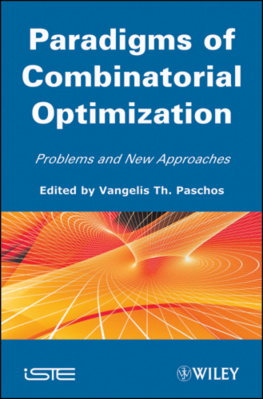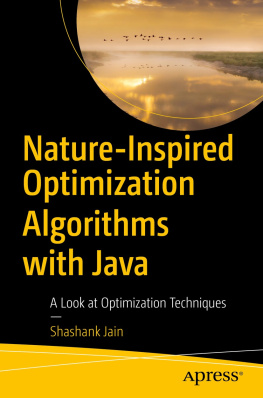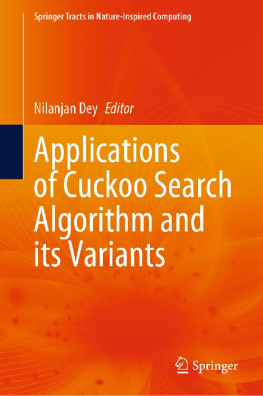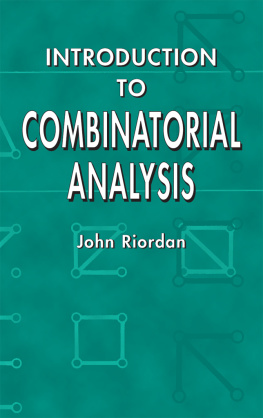First published in Great Britain and the United States in 2010 by ISTE Ltd and John Wiley & Sons, Inc. Adapted and updated from Optimisation combinatoire volumes 1 to 5 published 2005-2007 in France by Hermes Science/Lavoisier LAVOISIER 2005, 2006, 2007
Apart from any fair dealing for the purposes of research or private study, or criticism or review, as permitted under the Copyright, Designs and Patents Act 1988, this publication may only be reproduced, stored or transmitted, in any form or by any means, with the prior permission in writing of the publishers, or in the case of reprographic reproduction in accordance with the terms and licenses issued by the CLA. Enquiries concerning reproduction outside these terms should be sent to the publishers at the undermentioned address:
The rights of Vangelis Th. Paschos to be identified as the author of this work have been asserted by him in accordance with the Copyright, Designs and Patents Act 1988.
Combinatorial optimization / edited by Vangelis Th. Paschos.
v. cm.
Includes bibliographical references and index.
Contents: v. 1. Concepts of combinatorial optimization
-- ISBN 978-1-84821-148-3 (v. 2)
1. Combinatorial optimization. 2. Programming (Mathematics)
I. Paschos, Vangelis Th.
Paradigms of Combinatorial Optimization is the second volume of the Combinatorial Optimization series. It deals with advanced concepts as well as a series of problems, studies and research which have made, and continue to make, their mark on the evolution of this discipline. This work is divided into two parts:
: Paradigmatic Problems;
: New Approaches.
contains the following chapters:
Optimal Satisfiability by Cristina Bazgan;
Scheduling Problems by Philippe Chrtienne and Christophe Picouleau;
Location Problems by Aristotelis Giannakos;
MinMax Algorithms and Games by Michel Koskas;
Two-dimensional Bin Packing Problems by Andrea Lodi, Silvano Martello, Michele Monaci and Daniele Vigo;
The Maximum Cut Problem by Walid Ben-Ameur, Ali Ridha Mahjoub and Jos Neto;
The Traveling Salesman Problem and its Variations by Jrme Monnot and Sophie Toulouse;
01 Knapsack Problems by Grard Plateau and Anass Nagih;
Integer Quadratic Knapsack Problems by Dominique Quadri, Eric Soutif and Pierre Tolla;
Graph Coloring Problems by Dominique De Werra and Daniel Kobler.
All these chapters not only deal with the problems in question, but also highlight various tools and methods from combinatorial optimization and operations research. Obviously, this list is very limited and does not pretend to cover all the flagship problems in combinatorial optimization.
It is best to view the problems in this book as a sample that testifies to the richness of the themes and problems that can be tackled by combinatorial optimization, and of the tools developed by this discipline.
includes the following chapters:
Polynomial Approximation by Marc Demange and Vangelis Th. Paschos;
Approximation Preserving Reductions by Giorgio Ausiello and Vangelis Th. Paschos;
Inapproximability of Combinatorial Optimization Problems by Luca Trevisan;
Local Search: Complexity and Approximation by Eric Angel, Petros Christopoulos and Vassilis Zissimopoulos;
On-line Algorithms by Giorgio Ausiello and Luca Becchetti;
Polynomial Approximation for Multicriteria Combinatorial Optimization Problems by Eric Angel, Evripidis Bampis and Laurent Gourvs;
An Introduction to Inverse Combinatorial Problems by Marc Demange and Jrme Monnot;
Probabilistic Combinatorial Optimization by Ccile Murat and Vangelis Th. Paschos;
Robust Shortest Path Problems by Virginie Gabrel and Ccile Murat;
Algorithmic Games by Aristotelis Giannakos and Vangelis Th. Paschos.
The themes of this part are at the border between research operations and combinatorial optimization, theoretical computer science and discrete mathematics. Nevertheless, all these subjects have their rightful place in the vast scientific field that we call combinatorial optimization. They are developed, at least in part, at the heart of this discipline, fertilize it, widen its renown, and enrich its models.
For this volume, my thanks go firstly to the authors who have agreed to participate in the book. This work could never have come into being without the original proposal of Jean-Charles Pomerol, Vice President of the scientific committee at Hermes, and Sami Mnasc and Raphal Mnasc, the heads of publications at ISTE. I give my warmest thanks to them for their insistence and encouragement. It is a pleasure to work with them as well as with Rupert Heywood who has ingeniously translated this books material from the original French.
Vangelis Th. PASCHOS
June 2010
Given a set of constraints defined on Boolean variables, a satisfiability problem, also called a Boolean constraint satisfaction problem, consists of deciding whether there exists an assignment of values to the variables that satisfies all the constraints (and possibly establishing such an assignment). Often, such an assignment does not exist and, in this case, it is natural to seek an assignment that satisfies a maximum number of constraints or minimizes the number of non-satisfied constraints.
An example of a Boolean constraint satisfaction problem is the problem known as SAT, which consists of deciding whether a propositional formula (expressed as a conjunction of disjunctions) is satisfiable or not. SAT was the first problem shown to be NP-complete by Cook [COO 71] and Levin [LEV 73] and it has remained a central problem in the study of NP-hardness of optimization problems [GAR 79]. The NP-completeness of SAT asserts that no algorithm for this problem can be efficient in the worst case, under the hypothesis PNP. Nevertheless, in practice many efficient algorithms exist for solving the SAT problem.
Satisfiability problems have direct applications in various domains such as operations research, artificial intelligence and system architecture. For example, in operations research, the graph-coloring problem can be modeled as an instance of SAT. To decide whether a graph with n vertices can be colored with k colors, we consider kn Boolean variables, xij, i = 1,, n, j = 1,, k, where xij takes the value true if and only if the vertex i is assigned the color j. Hoos [HOO 98] studied the effectiveness of various modelings of the graph-coloring problem as a satisfiability problem where we apply a specific local search algorithm to the instance of the obtained satisfiability problem. The Steiner tree problem, widely studied in operations research, contributes to network design and routing applications. In [JIA 95], the authors reduced this problem to a problem that consists of finding an assignment that maximizes the number of satisfied constraints. Certain scheduling problems have been solved by using modeling in terms of a satisfiability problem [CRA 94]. Testing various properties of graphs or hypergraphs is also a problem that reduces to a satisfiability problem. In artificial intelligence, an interesting application is the planning problem that can be represented as a set of constraints such that every satisfying assignment corresponds to a valid plan (see [KAU 92] for such a modeling). Other applications in artificial intelligence are: learning from examples, establishing the coherence of a system of rules of a knowledge base, and constructing inferences in a knowledge base. In the design of electrical circuits, we generally wish to construct a circuit with certain functionalities (described by a Boolean function) that satisfy various constraints justified by technological considerations of reliability or availability, such as minimizing the number of gates used, minimizing the depth of the circuit or only using certain types of gates.









